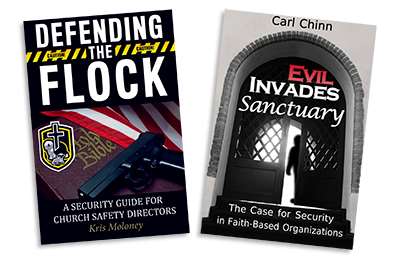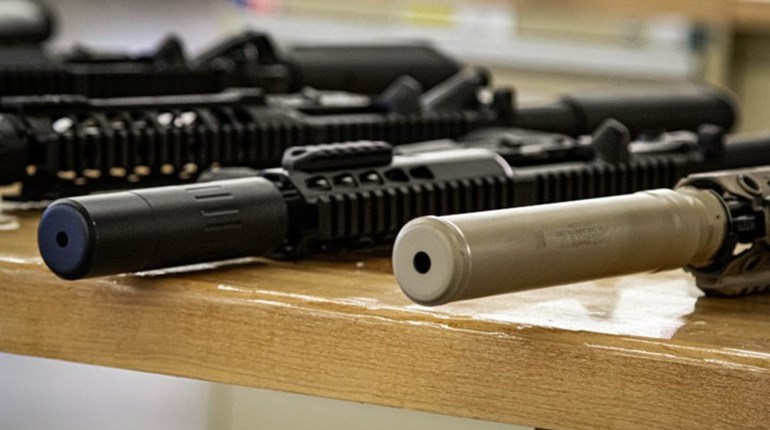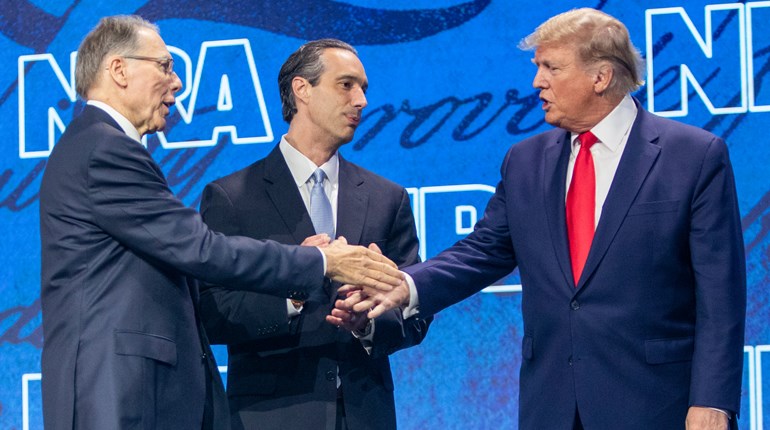
In 2009, an armed schizophrenic man walked into First Baptist Church in Maryville, Ill., during Sunday services. He confronted and fatally shot Rev. Fred Winters as Winters preached from the pulpit. Winters unsuccessfully tried to shield himself with his Bible, which exploded into confetti. The murderer then stabbed two other parishioners and himself before being apprehended.
Most of us also remember the 2019 murders at West Freeway Church of Christ in White Settlement, Texas, where a murderer opened fire during Sunday morning service. A livestream video shows Jack Wilson draw his handgun and kill the sociopath with a single shot.

Stories like these illustrate the rare but serious problem of murderers who target churches—and the particular challenges that face anyone confronting this problem. Houses of worship strive to be open and inviting; they are places of refuge for the vulnerable and needy; their doors are often left unlocked; strangers are welcome. They are places where violence should be unthinkable.
Unfortunately, those conditions are ripe for a violent mentally ill person or a terrorist to target, as illustrated by the 2016 arrest of an ISIS sympathizer who plotted a church massacre in Michigan and boasted, “It’s easy, and a lot of people go there. Plus, people are not allowed to carry guns in church.”
Unfortunately, crimes against church congregations are too common. In 2019, the FBI recorded thousands of assaults, vandalisms and burglaries in houses of worship, as well as dozens of kidnappings and nine homicides. The same year, the FBI recorded 1,715 crimes motivated by anti-religious sentiment, a 7% increase over previous years. The FBI also estimates that there was a 35% increase in attacks on churches between 2014 and 2018.
Carl Chinn thinks the official estimates are too low. Chinn is the president of the Faith Based Security Network, a group he created after managing security for a Colorado-based Christian ministry called Focus on the Family. In 1996, he and three others were taken hostage at the ministry by a disgruntled man who eventually surrendered. Chinn was also present for the 2006 shootout at Colorado’s New Life Church, where armed citizens helped thwart a would-be killer.
Chinn compiled a report from 1999 to 2018 cataloging 1,772 deadly force incidents in or around church properties. Chinn says that over half of incidents are robberies or domestic and personal conflicts; almost 75% of the incidents start and end outside the church, and 57% involve firearms.
The problem has drawn national and international scrutiny. In 2019, President Donald J. Trump (R) announced $25 million in funds to protect religious sites and houses of worship. The U.S. Senate held hearings in 2017 to discuss anti-religious violence. And the Department of Homeland Security and the FBI have each released guidance to mitigate attacks on houses of worship.
Legislatively, the topic remains active. A few states still ban guns in houses of worship, a half-dozen require express permission to carry and some, like Louisiana, recently eased up on church-carry restrictions.
In Florida, pressure grew to end a ban on carrying in churches after some high-profile attacks on congregations.
“Church or synagogue property is not government property,” said Marion Hammer, a former NRA president and a staunch advocate for Second Amendment rights who lives in Florida. “The state—any state—has no more right to strip away the right of churches or synagogues to allow firearms on church property than it does to prohibit you or me from having guns in our homes for self-defense or other lawful purposes.
“Religious institutions have the right to make their own decisions about whether or not they want guns on their property. It’s their right to decide who can and who cannot carry on church or synagogue property. In the exercise of one constitutional right—the First Amendment—they also have the right to exercise another constitutional right: the Second Amendment,” said Hammer.
Gun owners are often left wondering whether to attend services while being forced by government or religious leaders to disarm.
When a bill got to his desk last summer, Florida Gov. Ron DeSantis (R) signed it and thereby returned control of the issue to houses of worship, rather than the government.
Meanwhile, other states, like Missouri and Virginia, recently contemplated similar bills. Last June, North Carolina’s governor vetoed a bill that would have loosened certain carry restrictions for churches that double as schools.
Across various religions, there’s little consensus. Many leaders are reluctant to wade into this issue. The Mormon Church, for example, recently forbade its members from being armed during worship. Pope Francis, who is protected by the elite and heavily armed Swiss Guard, has hinted that he is in favor of gun control. The Dalai Lama softly condemned gun manufacturers, but when pressed on political restrictions, he emphasized that “real gun control comes from the heart.” The Tibetan leader also affirmed that it isn’t unreasonable for a homeowner to shoot an armed home invader.
Locally, church opinion is as diverse as the congregations and clergy attending them. Some see the issue as too delicate and divisive. Others host shooting events and concealed-carry classes—or host gun buy-backs and endorse gun-control activism.
Gun owners are often left wondering whether to attend services while being forced by government or religious leaders to disarm.
A Church-Safety Plan
People like Carl Chinn and Kris Moloney hope to give clarity to the issue. Moloney runs Sheepdog Church Security and has written two books on the subject. A 21-year U.S. Army veteran with 18 years in law enforcement, he became interested in this issue when his church, prompted by a theft, asked him to create security policies. He formulated a church-safety team. His initial drafts were basic, but became more sophisticated with time. His guidelines have gotten attention from neighboring churches, which have asked him to develop protocols for them as well. His church board advised him to make it a business, and in the intervening years, he has helped thousands of churches bolster their safety.
Moloney’s business provides online training on safety fundamentals, complete with quizzes and training certificates. Chinn’s group provides a vetted private forum for professionals to share knowledge and advice.
Both acknowledge that starting a conversation at a local church often faces hurdles of denial (it won’t happen here), dismissiveness (we’ve never done anything like that before) and sometimes pacifism (we won’t empower congregants to shoot intruders). With careful work, these can be overcome, but starting with the gun issue can quickly derail the discussion.
“Getting out of the active-shooter-only mindset can actually be quite a challenge, because a lot of our minds go there first,” Moloney says. “But if you start there, people will shut down right in front of your eyes. I prefer to call it a safety team because, otherwise, people start to imagine a chain-link fence, guard dogs and other caricatured ideas of security that can be contradictory to openness.”
Chinn agrees. “Don’t base the conversation on firearms. There’s a time to have that conversation. The first day you talk to your religious leader is not it. Start with the word ‘safety.’ Talk about medical vulnerabilities and fire-alarm systems.”
Moloney says, “If you’re diligent about other risks, you’ll have built up rapport and respect by the time deadly-force discussions come up.” He also notes that a guns-only approach is too narrow anyway. Threats come in many forms and good security protocols have to be layered and diverse. (For instance, Chinn says that a recent forum discussion on how to deal with a convicted sex offender who wanted to attend services concluded with: “We hope everybody experiences the grace of God, but we’re going to protect our kids in the meantime.”)

Both agree a good person with a gun is often the right answer to a bad person with a gun, but, says Moloney, “don’t neglect the other stuff.”
He also says that if you bring it up, be prepared to facilitate. “Pastors are often extremely busy people. They’re working on their weekly services, programs, hospital visitations and families. They’re stretched really thin.”
But aren’t there some denominations that stoutly oppose firearms no matter what? “It pains me to say it, but yes,” Chinn says. “There are certain religious leaders who let political opinion get in front of common-sense faith. When they hear the word security, they see a man with a gun in a pew. We’ve tried hard to dispel that image—security is so much more than carrying a firearm.”
Moloney says people have the right to be pacifists, but it’s not an excuse to ignore the threat of a violent intruder. There are also things like de-escalation training, nonlethal resistance and lockout and lockdown procedures.
Chinn believes naïve denial is dwindling. “Denial and dismissive attitudes were a huge issue in 2010, but it’s less of an issue now,” he says.
Moloney points out that overcoming resistance takes time, patience and awareness. His organization shares stories about church crimes in its newsletter to raise awareness. He’s seen increased demand for training modules like his Safety Member Certification, which covers the gamut of topics, such as severe weather, fire and HAZMAT safety, lockdowns, verbal de-escalation, patrols and safety protocols, use-of-force laws and mass-shooting response. Moloney also offers online consulting, as he says the demand and costs are too high to travel to every church that needs help.
“Providence isn’t a failsafe,” Moloney says. “The Bible is full of stories of God working through people to accomplish His purposes.” Church leaders almost always believe in being the hands and feet of God through community services and ministry, he points out, and this is no different.
Moloney says that since he started, other groups have begun promoting church safety, and plenty of churches are seeking out those services. The culture has also changed. “The government shouldn’t be telling churches what to do at all, let alone on gun policy. If churches want to set their own policies, that’s different,” says Moloney.
Once a team is up and running, Chinn doesn’t encourage excluding citizens from being armed. “We honor your right to carry your firearm, and using it to protect yourself and your immediate family, but we ask that you not intervene in safety-team concerns. We have a right to have firearms in this country, but we also have a team that trains together.”
Overall, Chinn sees a trend of reducing restrictions on firearms in churches. “I testified in front of the Texas legislature in 2017 because they wouldn’t allow people to engage in intentional security at their churches unless they were licensed by the state. Fortunately, we prevented that. Overall, the direction has mostly been positive.”

































